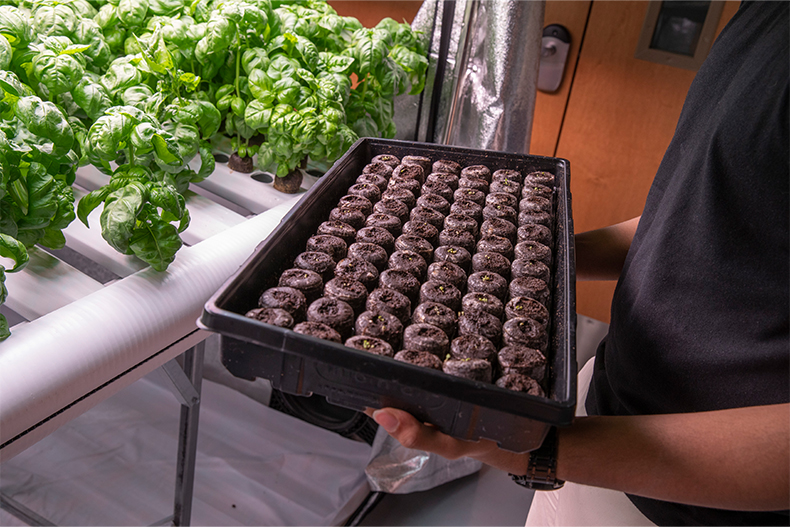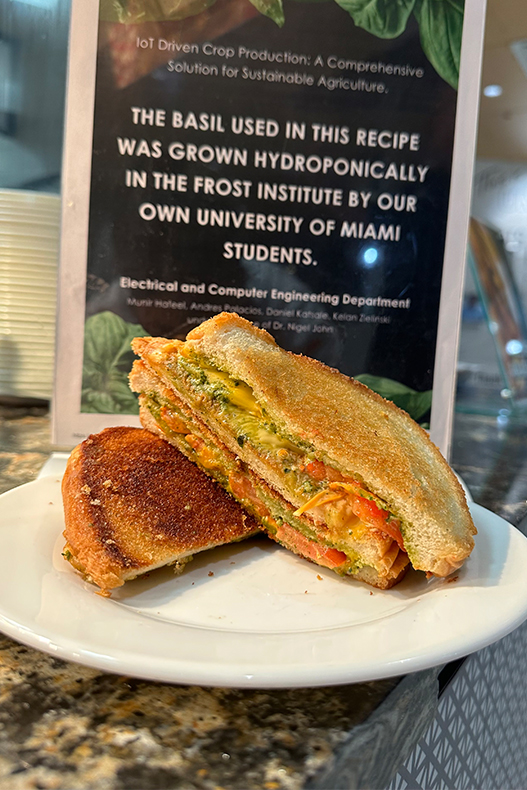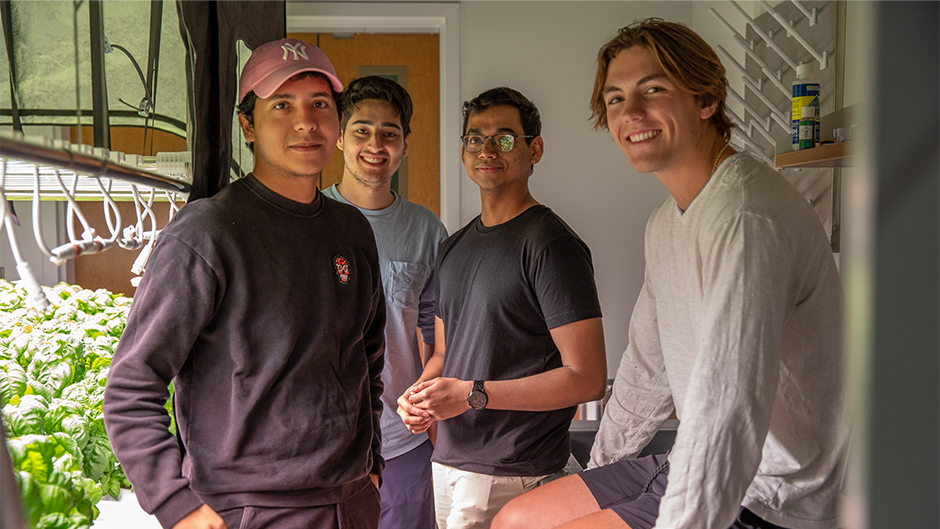The best-smelling room on campus may be tucked away on the third floor of the Frost Institute for Chemistry and Molecular Science.
Munir Hafeel, Andres Palacios, and Daniel Katsale came together—recruiting sophomore Kelan Zielinski—for their senior design project to build an indoor, hydroponic basil farm that uses machine learning algorithms and internet of things (IoT) technologies to, essentially, run itself.
“Our goal was to use computer engineering to build a crop production system more efficient than traditional agriculture and free of its side effects,” said Hafeel, a senior in the Department of Electrical and Computer Engineering.
The team uses a network of sensors to remotely monitor real-time conditions in their fifty-square-foot farm. “We collect nine million data points a month on factors like pH, temperature, humidity, and nutrient levels,” said Palacios, a senior in the Department of Electrical and Computer Engineering. The team regularly analyzes that data, compares it to ideal growing conditions they found in research publications.
“From the data,” added Katsale, a senior in the Department of Electrical and Computer Engineering, “we determine what to tweak in our design to get continually closer to optimal conditions.”
Hydroponic farms rely on water-based nutrients rather than soil, and the team’s system uses 90% less water per square foot than traditional open field farms. “Traditional agriculture depletes soil nutrient levels by using synthetic fertilizers,” Hafeel said, “and these nutrients pollute nearby water sources when it rains, killing aquatic life. Our system not only uses a tenth of the water, but it is self-contained, preventing any runoff risk.
“We’re really looking to build a data-driven system that allows farmers to grow crops remotely and efficiently,” said Hafeel. “For example, if our sensors detect too few nutrients in the water, our algorithm automatically tells the peristaltic pumps to release more. We have similar systems to regulate pH as well as dissolved oxygen levels.”
Why basil? “Basil’s six-week growing interval makes it the perfect crop for the project’s time constraints,” Hafeel said.
Their faculty mentor, Nigel John, lecturer in the Department of Electrical and Computer Engineering, has guided the team at each stage of the project. “The team’s goal," John said, "of using data analytics and artificial intelligence to augment planning and implementation decisions in crop production will have significant impact on sustainable agriculture."
“Dr. John understands the fine art of integrating software and hardware,” Hafeel said, “which is what this project is all about, how we can talk to our hardware and talk to our plants in return.”
The team recruited Zielinksi, sophomore in the Department of Electrical and Computer Engineering, to help them with the electrical engineering side of the project, assisting them develop a safe hardware prototype so, as Hafeel said, “none of us get electrocuted.”
Meeting Microsoft
Hafeel, a part-time student worker at UMIT, was connected to Microsoft by his supervisors. The team met with Microsoft and UMIT to learn the ideal way to integrate the sensors and software they were using.
“We jumped at the opportunity to meet Microsoft’s cloud solution architects and their FarmBeats team,” Hafeel said, “who are doing very similar work with open field farms.”
The impact the team envisions
Hafeel has had a long fascination with agriculture. He built his first hydroponic farm six years ago.
“There are so many variables when it comes to agriculture,” Hafeel said, “and back home in Sri Lanka, it has a huge impact on the mental health of farmers. The country has frequent incidents of suicide among farmers–a bad crop cycle can be so devastating as to drive them to drink their own pesticide.”
Computer engineering can “mitigate some of these issues,” he said, “by helping farmers minimize resource use and maximize harvests, addressing food demand too.”
Support from the College
Hammam Alsafrjalani, assistant professor of professional practice in the Department of Electrical and Computer Engineering, teaches the engineering senior design course. When the team came to him with funding and space concerns, Alsafrjalani who reached out to Pratim Biswas, dean of the College of Engineering. Biswas took a quick interest in the project, identifying sources of funding for the project while also lending the team lab space in the Frost Institute for Chemistry and Molecular Science.
“These bright, innovative undergraduate students approached me and I promptly decided to support them," Biswas said. "Their use of IOT and data-based approaches would further enable my research group's technologies. A quick visit to our Aerosol and Air Quality Research Laboratory (AAQRL) in the Frost Institute will indicate the success these students have had."
Biswas has utilized molecular sciences to understand plant nutrient pick up in multiple projects, developing approaches to deliver nutrients like fertilizers to crops more effectively. Biswas and his research group founded SmArT LLC, a start-up using nanotechnology for agricultural applications. “With a detailed molecular understanding," Biswas said, "we were able to use nanotechnology-based approaches to deliver nutrients through a plant’s leaves, avoiding the deleterious impacts of excess fertilizer. Over the next six months, we will demonstrate foliar delivery and other approaches, based on our knowledge of molecular interactions and nutrient pick up to further optimize the systems."
Lokesh Ramamoorthi, a lecturer in the Department of Electrical and Computer Engineering, has played a critical role as well, mentoring the team and helping them through a variety of sophisticated technical issues.
“This is one of the truly exciting senior design projects,” Ramamoorthi said. “The interdisciplinary nature of hydroponics farming—combining agriculture, hardware, software—these projects will be defining our sustainable food production in the future. While mentoring and guiding the students on software technicalities, I indeed learnt many aspects and complexities involved in food production from the students.”
Industry sponsorships
AmHydro, a national leader in hydroponic systems manufacturing, provided a system worth $4,000 to the team after Hafeel reached out inquiring about a sponsorship. “I explained to them what we were working on and they provided us with a system that has worked like a breeze,” said Hafeel. “It was super easy to integrate. Now, we’re able to harvest 2000 basil plants a year using 50 square feet. These systems are amazingly productive.”
Jiffy, a second sponsor of the project, provided seed starting materials that “helped us provide the right start for our seeds,” Hafeel said. “It was huge improvement over what we were doing before.”

Culinary partnership with UM Dining
None of the team’s basil goes to waste as UM Dining transformed the harvested herb into a variety of plates—a caprese flatbread and a vegan basil aioli accompanying vegan polenta fries by Chef Alfonso Mendoza, a pesto and tomato grilled cheese by Chef Joel Chamizo, and a Greek salad with basil vinaigrette by Campus Executive Chef Scot Emerson, who said, “[the basil] has a great nose, firm leaves and intense flavor with earthy notes.”

"This was a fabulous experience for us and the basil went to good use,” said Michael Ross, Resident District Manager at University of Miami Dining Services. “We used it all up and were able to come up with some very creative options that students loved.”
Join the team and the rest of the College of Engineering at the Senior Design Expo on May 2, 2023
Every year, the College of Engineering gives its graduating students the opportunity to showcase their capstone projects to the University community and the broader public. Register here.
See the groundbreaking projects our students have been working on and, perhaps, you may leave with some basil.

